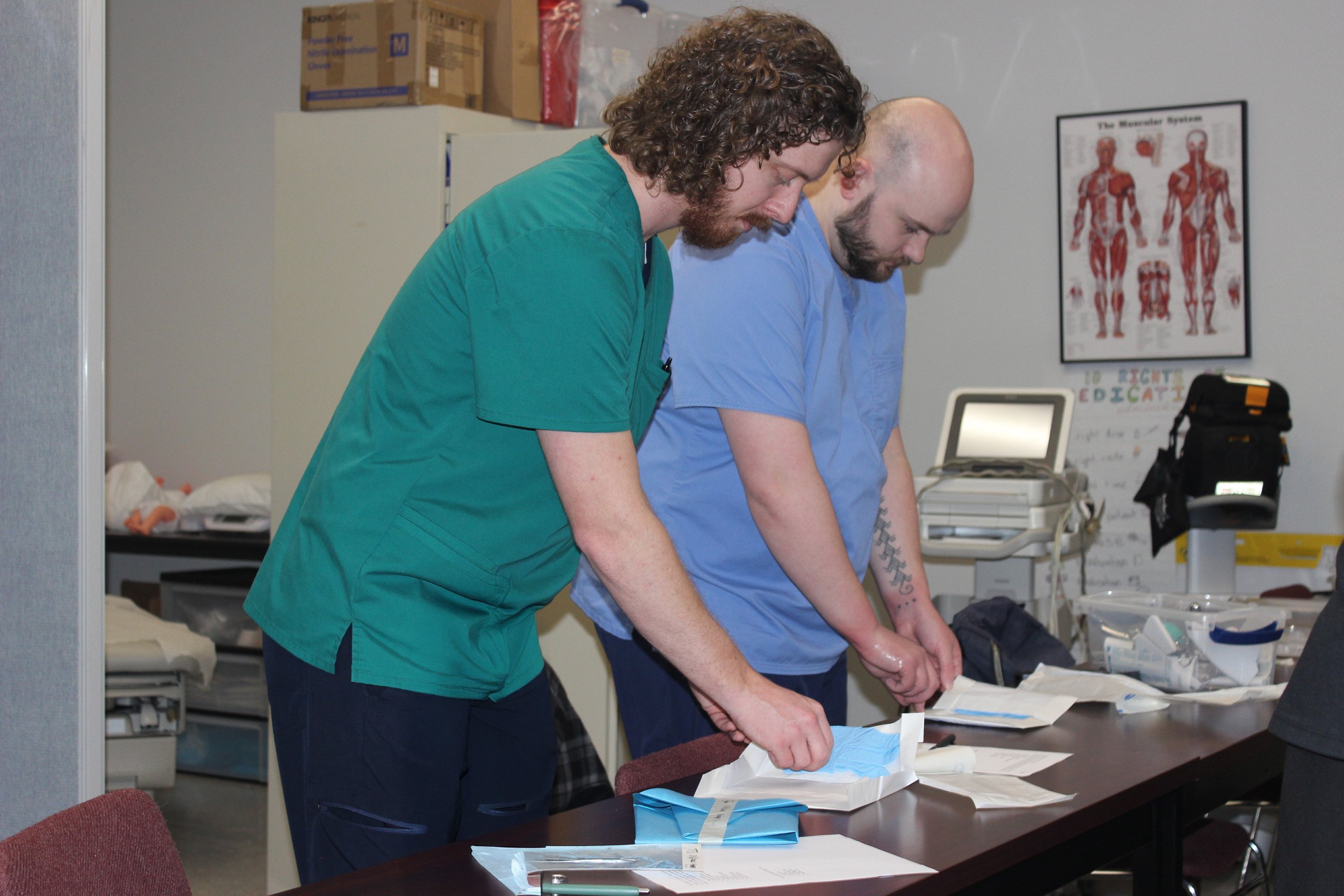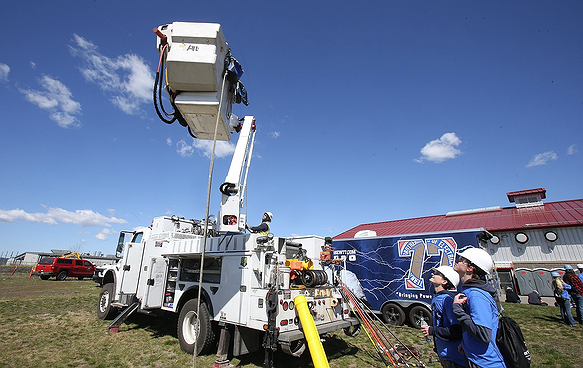Local education, training leaders discuss workforce development in a changing economy

Jeremy Fromm, with Idaho Forest Group, teaches a class in programmable logic controllers at the North Idaho College Workforce Training Center. Students learn skills in automation and control systems, which are essential to modern manufacturing processes.
Schools and training centers in North Idaho are preparing today's students to become successful workers of tomorrow.
Young people and adults who wish to return to the workforce have several options for pursuing academic pathways as well as career technical education, certifications or simply enriching their knowledge and expanding their understanding of topics or skills that will be useful in their chosen lines of work.
The North Idaho College Workforce Training Center at 525 S. Clearwater Loop in Post Falls offers a wealth of training programs, including apprenticeships, professional development, health care, trades and industry, emergency services, technology and more.
"NIC Workforce Training is continually evolving to meet the dynamic needs of the regional economy," NIC Executive Director of Workforce and Economic Development Colby Mattila said.
He said the Workforce Training Center's programs are strategically designed to address critical workforce gaps across North Idaho.
"We regularly adapt existing training to align with developments in local industries," he said. "This ensures our students receive relevant, high-demand, industry-aligned instruction that equips them with practical skills for immediate employment — while also supporting the region’s economic growth by providing a skilled and adaptable workforce."
Mattila said some of the Workforce Training Center's most in-demand programs include trades apprenticeships for electricians, plumbers and heating, ventilation and air conditioning technicians; health care certifications for certified nursing assistants, medical assistants and dental assistants; and commercial driver’s license training.
"Through close collaboration with local industry partners, we continually explore new training opportunities and develop programs that respond directly to workforce needs," Mattila said. "For example, in partnership with the logging industry, we recently launched a logging equipment operator apprenticeship program. Additionally, with a growing demand for aircraft mechanics, we will launch a new airframe and powerplant mechanic apprenticeship program this fall."
At the K-12 level, the Coeur d'Alene, Post Falls and Lakeland Joint school districts provide diverse course options for the diverse student populations they serve.
"In addition to traditional academics, students in the Post Falls School District have the opportunity to participate in courses tailored to a variety of future career paths, such as agriculture, digital media, business and culinary arts," Post Falls Superintendent Dena Naccarato said. "These courses provide students with not only an understanding of theory, but also hands-on experiences and practical applications."
She said in any career, skills such as reasoning and communication are essential.
"Students in the Post Falls School District graduate prepared to be productive, contributing and responsible members of the workforce," Naccarato said. "Preparing students for future work has become quite challenging as 'new' jobs are being created each year. Some of our students may end up employed in a field that was not in existence when they graduated."
In a joint venture between Post Falls, Coeur d'Alene and Lakeland as well as Kootenai county patrons and the business community, local students are exposed to the trades at Kootenai Technical Education Campus at 6838 W. Lancaster Road, Rathdrum.
Kristin Parker, KTEC career and technical college adviser, said over the past five years, she has observed an increasing number of middle schools and high schools are promoting health care and trades programs. In the past two years, KTEC has hosted tours for over 1,500 eighth grade students from Coeur d'Alene, Post Falls and Lakeland.
"We also saw an increase in student numbers for the Hard Hats, Hammers, Healthcare and Hot Dogs event, held at KTEC for Region One high schools this year," she said.
KTEC's enrollment numbers are consistent and continue to grow, Parker said.
"With the growth in our area, counselors and educators are seeing the importance of what KTEC and other schools like KTEC do, as well as the North Idaho College Workforce Training and the NIC Parker Technical programs," she said.
KTEC instructors continually reach out to the industry to determine what local employers need.
Those relationships are key to the education of our students," Parker said. "Employers interested in our students are encouraged to visit and discuss various employment opportunities with them. Some employers are not looking to hire our students right out of high school and instead encourage them to pursue post-secondary education and/or workforce training before considering them for employment. It provides our students with more information to make informed decisions about their future and it reinforces what the industry needs."
KTEC has a firm attendance policy students must follow, Parker said.
"We are preparing students for the workforce," she said. "We want students to be here consistently, just like employers want employees to be at their jobs consistently. We are helping students prepare for the workforce and transition into adulthood."
Plumbing is KTEC's newest program.
"Students who complete that program will take a year off from completing their four-year apprenticeship program," Parker said. "We are currently experiencing high demand for all our programs. That makes sense based on what the industry is telling us. All of our certifications are based on what the industry is asking for."
In the Coeur d'Alene School District, every high school student completes a Future Readiness Project, which is designed to demonstrate growth and proficiency in six core competencies: character, communication, collaboration, content knowledge, creativity and critical thinking.
"Education is often criticized for placing too much emphasis on test scores and not enough on real-world, job-related skills," the district's Executive Director of Community Relations Stefany Bales said. "This project helps address those concerns. Students develop a portfolio over the course of their high school experience that reflects their progress in these key areas."
In addition to the portfolio, students are required to complete a Workplace Exploration Experience, which involves a minimum of 10 hours working with a mentor to explore real-world career opportunities. Students are evaluated on key performance indicators, including professionalism and work ethic, engagement and participation, communication and feedback and overall effectiveness, Bales said.
The project culminates in a senior presentation that summarizes their learning and workplace experience.
"This four-year effort plays a critical role in helping students transition successfully from high school into their future careers," Bales said.
According to the World Economic Forum's Future of Jobs Report 2025, some of the fastest-growing jobs have been found to be in technology, data and artificial intelligence, but growth is also expected for core economy roles including delivery drivers, care roles educators and farm workers.
"Fastest-growing skills by 2030 will include technological skills alongside human skills, such as cognitive skills and collaboration," the World Economic Forum states on its website, weforum.org. "Collective action in the public, private and education sectors is urgently needed to address the growing skills gaps."












